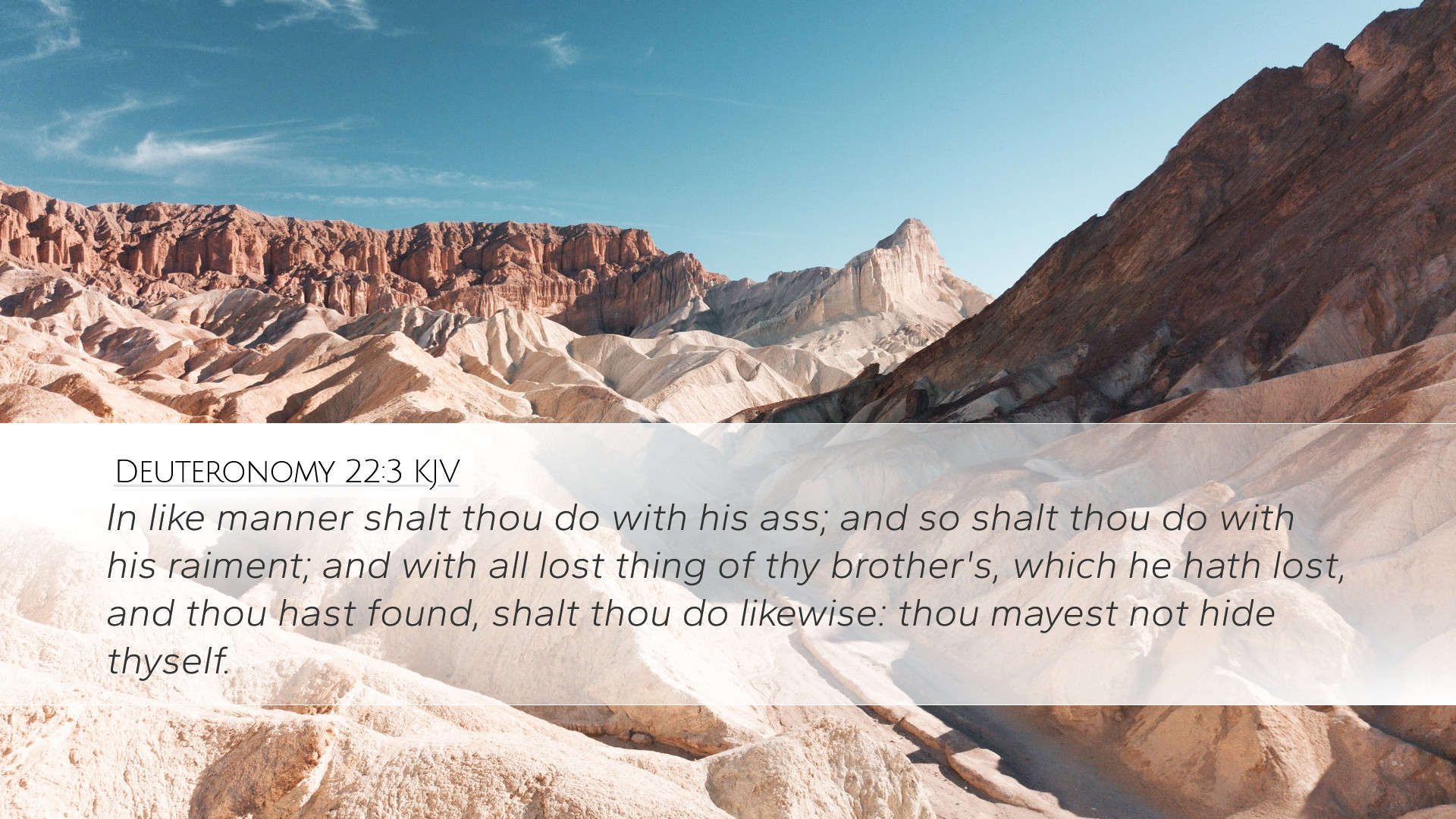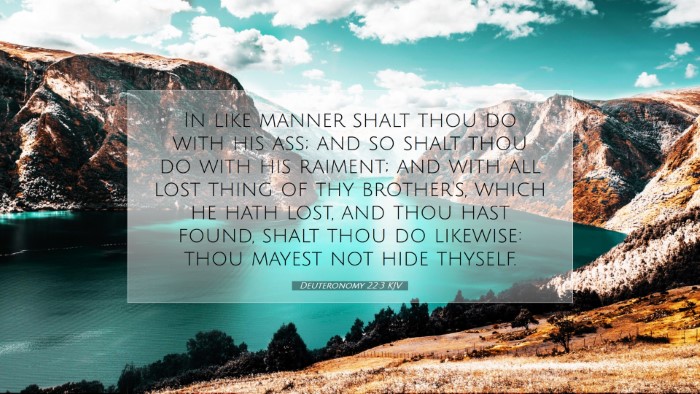Commentary on Deuteronomy 22:3
Deuteronomy 22:3 states: "In like manner thou shalt do with his ass; and so shalt thou do with his raiment; and with all lost thing of thy brother's, which he hath lost, and thou hast found, shalt thou do likewise: thou mayest not hide thyself."
Contextual Overview
This verse is part of a broader legal framework found in the book of Deuteronomy, where Moses conveys God's laws to the Israelites. The emphasis on restitution and care for one's neighbor is prevalent throughout this chapter, reflecting a community-oriented approach to morality and social responsibility.
Insights from Matthew Henry's Commentary
Matthew Henry emphasizes the importance of practical love and duty towards one's neighbor. He highlights that the commandment signifies a moral obligation to assist others by returning lost items.Caring for others, as stipulated in this verse, demonstrates true piety and respect for one's community.
This has implications beyond mere adherence to the law; it challenges individuals to cultivate an ethic of brotherhood and responsibility. Henry notes that by engaging with the needs of others, one fosters a spirit of unity and trust within society.
Insights from Albert Barnes' Commentary
Albert Barnes provides an in-depth analysis of the verse's application in ancient Israelite society. He discusses the significance of restitution in promoting fairness and justice among family and community members.
- Justice and Equity: Barnes argues that returning lost items is a testament to one’s integrity and fairness. The command is not merely a social nicety but a profound ethical directive that obligates the faithful to act justly.
- Community Cohesion: He further notes that such practices foster communal bonds and mitigate conflict, encouraging a spirit of cooperation among individuals.
- Broader Applications: Barnes suggests these principles extend into contemporary Christian ethics, calling believers to act with integrity in relationships, especially in matters of property and trust.
Insights from Adam Clarke's Commentary
Adam Clarke elaborates on the moral implications of this law, considering its role in the overall moral framework within the Mosaic laws.
- Divine Mandate: Clarke asserts that failing to return lost items is not just a lapse in moral judgment but an affront to God's commands. He underscores that God’s laws are intended to promote a communal structure rooted in love and respect for one another.
- Personal Accountability: He brings attention to the personal responsibility one has in their neighbor’s affairs, considering negligence as a serious moral failing.
- The Heart of the Law: In Clarke’s view, the heart of this command is a reflection of God’s character, which calls the faithful to mirror His love and commitment to justice in their daily interactions.
Theological Implications
The theological significance of Deuteronomy 22:3 extends beyond legalism into the realm of relational ethics within the community of believers. These insights underscore several fundamental concepts:
- Love Your Neighbor: The call to return items reinforces the biblical principle of loving one’s neighbor as oneself (Mark 12:31). Jesus emphasized this in the New Testament, connecting it to the heart of the law.
- Reflecting God’s Kingdom: Actions rooted in care for others provide a glimpse of God's kingdom, which is characterized by justice, mercy, and interdependence among its citizens.
- Covenantal Relationship: The law acts as a guide for covenantal relationships, emphasizing the importance of community and mutual support under God’s overarching sovereignty.
- Ethics in Modern Context: For contemporary believers and leaders, these principles call forth a reassessment of personal and societal ethics, urging a move toward restitution, compassion, and collective responsibility.
Practical Applications for Today’s Believers
This verse challenges modern Christians to evaluate their actions and interactions within their communities:
- Promote Integrity: Be proactive in returning lost items and addressing the needs of those around you, embodying integrity in your circles.
- Foster Community Relationships: Engage with your community to build a supportive network that reflects the love and values found in Scripture.
- Pursue Justice: Advocate for just practices in personal and professional settings, and work to support those who may have lost property unjustly.
- Teach Others: Share these biblical values in educational settings, fostering a deeper understanding of ethical responsibility among peers.
Conclusion
Deuteronomy 22:3 reminds us of the foundational values of community, love, and responsibility within the body of Christ. Drawing from the insights of respected biblical commentators helps to illuminate the deeper meanings behind this verse. It provides a framework for understanding how ancient commands remain relevant today, urging believers to live with integrity and actively support their neighbors. As one reflects on this scripture, let it inspire actions that resonate with the heart of God’s covenantal love.


